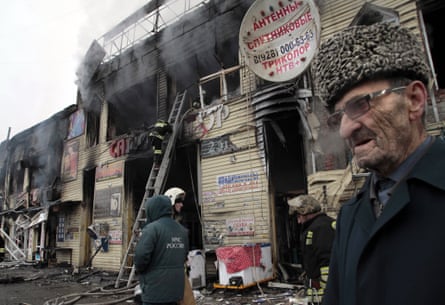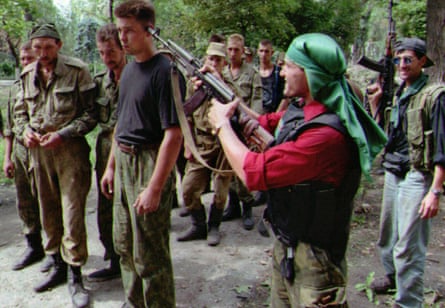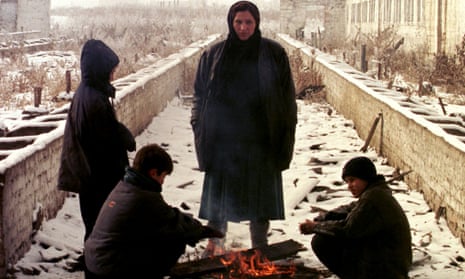On 11 December 1994, the first Chechen war began. It is worth remembering what preceded the outbreak of this bloody war that did so much to change the course of our nation’s history. The first and second Chechen wars murdered Russian democracy in its cradle, for when the cannons sing the people thirst for blood and opponents of government become traitors to the nation; elections lose their meaning and parliament ceases to be a place for discussion.
Everything that has happened since then and all that is happening today is but a consequence of this war.
On 6 August 1990, Boris Yeltsin, head of the Russian Soviet Federative Socialist Republic, addressed regional leaders: “Help yourself to as much sovereignty as you can swallow,” he said. So began what Gorbachev called “the parade of sovereignties” and with it, the slide towards the federalisation of Russia, which became an independent state in December 1991.
The local elites did not all want the same thing. Most of Russia’s territories readily agreed to the conditions set out in the federal treaties of 31 March 1991, but some of the former autonomous republics within the Russian federation, particularly those with oil, sought to acquire a much greater degree of independence.
Chechnya was a case in point. The fighter pilot Dzhokhar Dudyaev came to power after the elections of October 1991 and on 1 November, he issued a decree entitled On the state sovereignty of the Chechen republic. The authorities in Moscow, who had just survived an attempted coup d’état, didn’t accord it much importance. Then came the Belavezha accords that dissolved the Soviet Union. There were other things to be done.
Tension between Moscow and Grozny rose exponentially over the course of 1992. In the end, Russian army units left Chechen territory of their own free will, unopposed, leaving weapons and ammunition dumps. But Dudayev, having built up his own armed forces and equipped them with these “trophy” weapons, continued to insist on Chechnya’s secession from Russia.

In December 1993, the Provisional Council of the Chechen Republic was set up to act as a counterweight to President Dudayev. It was led by Umar Avturkhanov, the pro-Russian head of the Upper Terek region. He, in turn, acquired weapons and the council’s leaders started to train at Russian firing ranges.
From the summer of 1994, fighting broke out intermittently between supporters and opponents of Dudayev and on 2 August, Avturkhanov appealed to the Russian president Boris Yeltsin for support. Russian army units and interior troops started to mass on the border with Chechnya.
On 26 November 1994, Avturkhanov’s men stormed Grozny with weapons, armoured vehicles and helicopters supplied by Moscow. The Federal Counterintelligence Service, today’s FSB, raised “volunteers” from the ranks of the Russian army and officer corps, mainly from the tank and rifle divisions. They were granted “extraordinary leave” and left with their military equipment to be captured or killed on the streets of the Chechen capital.
Officially at least, Moscow categorically denied that its military personnel, draftees and enlistees took part in these operations, just as it denied the shelling of Grozny by crews of the North Caucasus military district.
But the attack stalled and on 30 November 1994, Yeltsin signed a decree entitled On actions [needed] to restore constitutional law and order across the territory of the Chechen republic. War had been declared. On 11 December, Russian troops crossed the border into Chechnya.
Pavel Grachev, the Russian minister of defence, then promised to take Grozny with just two divisions of airborne troops: his new year’s attack failed and whole brigades were destroyed, giving way to bloody bombardments, a trade in hostages, terrorist attacks across Russia and a second Chechen war. To this day, no one knows how many people died.

Yet this madness could have been prevented: all responsible politicians, more or less, called on Yeltsin to pick up the phone, ring Dudayev and come to an agreement. In response to their appeals, the presidential administration announced that it was impossible to reach the Chechen leader by phone.
On 1 December 1994, at a time when the noises coming out of the Kremlin suggested that the government was making fitful attempts to establish contact with Grozny, journalists from Novaya Gazeta sat around a landline and attempted to reach Dzhokhar Dudayev on the phone that lay in his reception room. On the first call, fifth ring, a man picked up the receiver. Hearing journalists on the other end, he went in search of his boss and a few minutes later, we opened a dialogue with the President of Chechnya. It went like this:
Novaya Gazeta: Dzhokhar Musayevich, what is happening at the moment?
Dzhokhar Dudayev: Here in Grozny, we are now dealing with the effects of yet another rocket attack, successfully I might add…
NG: Are you able to say for sure who attacked the city? Do you have evidence of Russian military involvement?
DD: That’s a strange question, young man. Everyone has known for ages that Russia is fighting here, not the opposition… What this opposition is, I don’t know… As far as responsibility for the last rocket attack is concerned, you have a better handle on that in Moscow, the generals do. I know that 150 armoured vehicles penetrated the outskirts of Grozny, 67 of them tanks. We repelled the attack, destroyed most of the vehicles and took the crews prisoners. I repeat, Russian crews… Around 70 journalists from all over the world have come here and they have seen this too.
NG: We are very concerned about the fate of Russian prisoners of war. How are they faring?
DD: I am doing my best to keep them alive. I even issued an order that they all be transferred to a safe place so that they are not fired upon. But someone found out and straight after they were transferred came a missile strike from a helicopter. Clearly, not everyone wants them to return [to Russia] and tell [their stories].
NG: That was the Russian airforce?
DD: Of course, what do you think? Unlike me, the Russian commanders and generals, it seems, don’t care about their soldiers’ lives.
NG: Is it really not possible to resolve this conflict peacefully?
DD: There is always hope. For now, I’m restraining them all, but it can’t last for long. Yeltsin won’t even talk to me on the phone.
This article first appeared on Novaya Gazeta. Translation by Cameron Johnston

Comments (…)
Sign in or create your Guardian account to join the discussion